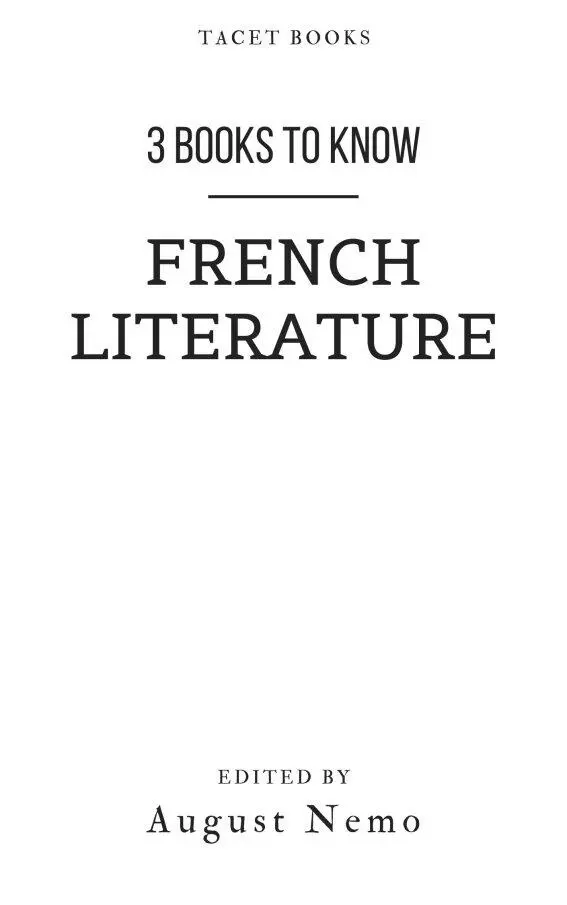
Title Page
Introduction
Authors
Germinal
Les Misérables
Madame Bovary Конец ознакомительного фрагмента. Текст предоставлен ООО «ЛитРес». Прочитайте эту книгу целиком, купив полную легальную версию на ЛитРес. Безопасно оплатить книгу можно банковской картой Visa, MasterCard, Maestro, со счета мобильного телефона, с платежного терминала, в салоне МТС или Связной, через PayPal, WebMoney, Яндекс.Деньги, QIWI Кошелек, бонусными картами или другим удобным Вам способом.
About the Publisher Конец ознакомительного фрагмента. Текст предоставлен ООО «ЛитРес». Прочитайте эту книгу целиком, купив полную легальную версию на ЛитРес. Безопасно оплатить книгу можно банковской картой Visa, MasterCard, Maestro, со счета мобильного телефона, с платежного терминала, в салоне МТС или Связной, через PayPal, WebMoney, Яндекс.Деньги, QIWI Кошелек, бонусными картами или другим удобным Вам способом.
Welcome to the 3 Books To Know series, our idea is to help readers learn about fascinating topics through three essential and relevant books.
These carefully selected works can be fiction, non-fiction, historical documents or even biographies.
We will always select for you three great works to instigate your mind, this time the topic is: French Literature,
Germinal by Émile Zola.
Les Misérables by Victor Hugo.
Madame Bovary By Gustave Flaubert.
This is one of many books in the series 3 Books To Know. If you liked this book, look for the other titles in the series, we are sure you will like some of the topics.

Émile Zola was born April 2, 1840 in Paris, France. In 1865 he published his controversial first novel, La Confession de Claude . In the following years he continued his journalism career in while publishing two novels. In 1868, he decided to write a large-scale series of novels, Les Rougon-Macquart. As the founder of the naturalist movement, Zola also published several treatises to explain his theories on art. He died on September 28, 1902.
Victor Marie Hugo was a French poet, novelist, and dramatist of the Romantic movement. Hugo is considered to be one of the greatest and best-known French writers. Hugo was at the forefront of the Romantic literary movement with his play Cromwell and drama Hernani. Many of his works have inspired music, both during his lifetime and after his death, including the musicals Notre-Dame de Paris and Les Misérables. He produced more than 4,000 drawings in his lifetime, and campaigned for social causes such as the abolition of capital punishment.
Gustave Flaubert was a French novelist. Highly influential, he has been considered the leading exponent of literary realism in his country. He is known especially for his debut novel Madame Bovary, his Correspondence, and his scrupulous devotion to his style and aesthetics. The celebrated short story writer Guy de Maupassant was a protégé of Flaubert. Flaubert famously avoided the inexact, the abstract and the vaguely inapt expression, and scrupulously eschewed the cliché. In a letter to George Sand he said that he spends his time "trying to write harmonious sentences, avoiding assonances."

by Émile Zola
––––––––

Introduction
by Havelock Ellis
––––––––

'GERMINAL' was published in 1885, after occupying Zola during the previous year. In accordance with his usual custom—but to a greater extent than with any other of his books except La Débâcle—he accumulated material beforehand. For six months he travelled about the coal-mining district in northern France and Belgium, especially the Borinage around Mons, note-book in hand. 'He was inquisitive, was that gentleman', miner told Sherard who visited the neighbourhood at a later period and found that the miners in every village knew Germinal. That was a tribute of admiration the book deserved, but it was never one of Zola's most popular novels; it was neither amusing enough nor outrageous enough to attract the multitude.
Yet Germinal occupies a place among Zola's works which is constantly becoming more assured, so that to some critics it even begins to seem the only book of his that in the end may survive. In his own time, as we know, the accredited critics of the day could find no condemnation severe enough for Zola. Brunetière attacked him perpetually with a fury that seemed inexhaustible; Schérer could not even bear to hear his name mentioned; Anatole France, though he lived to relent, thought it would have been better if he had never been born. Even at that time, however, there were critics who inclined to view Germinal more favourably. Thus Faguet, who was the recognized academic critic of the end of the last century, while he held that posterity would be unable to understand how Zola could ever have been popular, yet recognized him as in Germinal the heroic representative of democracy, incomparable in his power of describing crowds, and he realized how marvellous is the conclusion of this book.
To-day, when critics view Zola In the main with indifference rather than with horror, although he still retains his popular favour, the distinction of Germinal is yet more clearly recognized. Seillière, while regarding the capitalistic conditions presented as now of an ancient and almost extinct type, yet sees Germinalstanding out as 'the poem of social mysticism', while André Gide, a completely modern critic who has left a deep mark on the present generation, observes somewhere that it may nowadays cause surprise that he should refer with admiration to Germinal, but it is a masterly book that fills him with astonishment; he can hardly believe that it was written in French and still less that it should have been written in any other language; it seems that it should have been created in some international tongue.
The high place thus claimed for Germinal will hardly seem exaggerated. The book was produced when Zola had at length achieved the full mastery of his art and before his hand had, as in his latest novels, begun to lose its firm grasp. The subject lent itself, moreover, to his special aptitude for presenting in vivid outline great human groups, and to his special sympathy with the collective emotions and social aspirations of such groups. We do not, as so often in Zola's work, become painfully conscious that he is seeking to reproduce aspects of life with which he is imperfectly acquainted, or fitting them into scientific formulas which he has imperfectly understood. He shows a masterly grip of each separate group, and each represents some essential element of the whole; they are harmoniously balanced, and their mutual action and reaction leads on inevitably to the splendid tragic dose, with yet its great promise for the future. I will not here discuss Zola's literary art (I have done so in my book of Affirmations); it is enough to say that, though he was not a great master of style, Zola never again wrote so finely as here.
Читать дальше

















